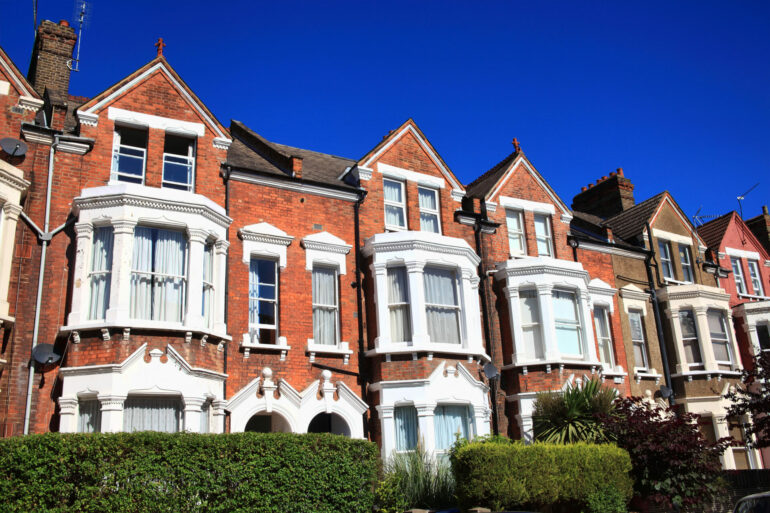House prices have soared by a record-breaking £55,000 since the pandemic began and are still rising, according to Rightmove.
The average price of a home has reached a record high for the fourth month in a row, jumping by £7,400 (2.1%) in May, according to the website.
And across Britain the average asking price for a property this month is £367,501, up from £360,101 in April.
This compares to a rise of just £6,218 in asking prices in the two years before the pandemic, and illustrates how the frenzied market activity has led to two-year price growth in cash terms never before witnessed in over twenty years of tracking prices.
The number of buyers contacting estate agents is 14% down on the stamp-duty-fuelled market of this time last year, but is up by 31% on the more comparable market of 2019.
The number of properties available to buy is 55% down on the levels seen in 2019, meaning that supply and demand look likely to remain out of kilter for at least the rest of the year.
The number of sales agreed is up by 12% in the year to date compared to 2019 even with restricted choice, though is down 17% compared to the exceptional market of the same period last year.
These numbers suggest that a lack of homes for sale rather than a lack of desire from buyers is what is dictating the pace of the market. New stock is most urgently needed in the mid-market sector of two and three bedroom semi-detached homes, which are seeing the most competition from buyers.
Tim Bannister Rightmove’s director of property science, said: “People may be wondering why the housing market is seemingly running in the opposite direction to the wider economy at the moment.
“What the data is showing us right now is that those who have the ability to do so are prioritising their home and moving, and the imbalance between supply and demand is supporting rising prices.
“Though demand is softening from the heady levels we saw this time last year, the number of buyers enquiring is still significantly higher than during the last ‘normal’ market of 2019, while the number of homes for them to choose from remains more constrained.
“We anticipate that the effects of the increased cost of living and rising interest rates will filter through to the market later in the year, and a combination of more supply of homes and people weighing up what they can afford will help to moderate the market.”
As interest rates creep up, new Rightmove analysis tracks first-time buyer affordability over the last 10 years.
This month, average monthly mortgage payments (£901) overtake average monthly rental payments (£887). However, the data shows that over the last 10 years, the gap in payments has narrowed, meaning it is no longer notably cheaper to rent in terms of monthly outgoings.
This new affordability analysis is based on a household taking out a 90% loan-to-value mortgage, at the average two-year fixed interest rate, and looks at a typical first-time-buyer home of two bedrooms or fewer, and the average monthly equivalent rental payments.
The average monthly mortgage payment for a typical first-time-buyer home has increased by 13% (+£100) since December last year following four interest rate rises, although this is only 11% (+£87) higher than ten years ago.
This may be surprising considering the strong house price growth over the last 10 years, however it illustrates that a decade of historically low interest rates have effectively compensated for rising house prices in terms of monthly outgoings on a mortgage.
By contrast, equivalent monthly rental payments are 40% higher than ten years ago, as tenants feel the full effect of rising costs. Rents are currently rising at the fastest pace that Rightmove has ever recorded.
Reaction
Tomer Aboody, director of property lender MT Finance:
“With first-time buyers needing to find ever-bigger deposits as asking prices continue to rise, worryingly the market seems to be running further away from them. With continued significant demand for homes and buyers who are able, and willing, to stretch themselves to afford them, prices are still on the rise.
“As mortgage rates increase along with the cost of living, some homeowners may potentially look to downsize in the near future, maximising their property’s value while banking the equity for savings that they can live off. This could free up larger family homes for those moving up the ladder, helping keep prices in check.”
Jeremy Leaf, north London estate agent and a former RICS residential chairman:
“Market activity at present is determined more by a shortage of stock than a softening in demand despite recent sharp increases in the cost of living and especially interest rates.
“Rightmove’s figures are, of course, based on asking not selling prices, neither of which are rising as rapidly as for most of last year. An up to nine-month delay in Land Registry recording price-paid information may explain at least some of the difference between the two.
“However, unless that demand is satisfied, it tends to fizzle out. As a result, transaction numbers are falling even if lack of choice is helping to maintain values so we’re seeing no signs of any imminent correction.”




